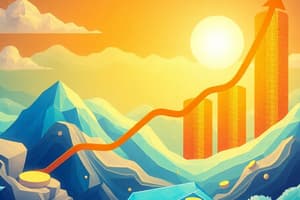Podcast
Questions and Answers
What is the central concept of macroeconomics that measures all final goods and services produced within a country's borders?
What is the central concept of macroeconomics that measures all final goods and services produced within a country's borders?
Gross Domestic Product (GDP)
What is the equation that links GDP to components like consumption, investment, government spending, net exports, and savings?
What is the equation that links GDP to components like consumption, investment, government spending, net exports, and savings?
Y = C + I + G + NX
What does macroeconomics primarily focus on: individual behaviors or the performance of entire economies?
What does macroeconomics primarily focus on: individual behaviors or the performance of entire economies?
Performance of entire economies
What do policymakers often use to gauge economic wellbeing that can be linked back to fluctuations in GDP?
What do policymakers often use to gauge economic wellbeing that can be linked back to fluctuations in GDP?
What does GDP provide insights into regarding the economy's dynamics?
What does GDP provide insights into regarding the economy's dynamics?
What is the key relationship between macroeconomic variables that involves the total output known as 'national income'?
What is the key relationship between macroeconomic variables that involves the total output known as 'national income'?
What is the main difference between Keynesian and neoclassical economic theories?
What is the main difference between Keynesian and neoclassical economic theories?
How is unemployment rate calculated?
How is unemployment rate calculated?
What is inflation and how do central banks usually target it?
What is inflation and how do central banks usually target it?
What is the purpose of deficit spending according to Keynesian economics?
What is the purpose of deficit spending according to Keynesian economics?
Why do high levels of inflation lead central banks to raise interest rates?
Why do high levels of inflation lead central banks to raise interest rates?
What are some of the key areas macroeconomics focuses on?
What are some of the key areas macroeconomics focuses on?
Study Notes
Understanding Macroeconomics: A Deeper Look into Economy's Big Picture
Macroeconomics is a branch of economics dealing with the behavior and performance of entire economies rather than individuals and specific markets. This field tackles questions like how national income affects employment rates, what influences inflation levels, and why countries experience economic growth or recessions. Here we'll delve deeper into this fascinating realm of understanding our global economy.
Gross Domestic Product (GDP)
The most central concept of macroeconomics is "the Gross Domestic Product," which measures all final goods and services produced within borders during a given period. It serves as a barometer of a nation's overall economic health and provides insights into aggregate demand and supply dynamics. Inflation rate and unemployment level, two common indicators used by policymakers to gauge economic wellbeing, can often be traced back to fluctuations in GDP.
National Income Identity
A key relationship between macroeconomic variables is the equation linking GDP to other important components such as consumption, investment, government spending, net exports, and savings:
[Y = C + I + G + NX]
This expression helps us understand how different sectors interact to generate total output – also known as "national income." If one sector weakens, it could potentially slow down growth. For instance, if consumer confidence falters, fewer goods will be consumed leading to less revenue for producers.
Keynesian Versus Classical Economic Theory
John Maynard Keynes revolutionized thought in favor of activist fiscal policy when he proposed his theory arguing that governments must intervene during times of depression to avoid prolonged stagnation. His notion challenged classical economic theories suggesting an automatic adjustment mechanism would address economic downturns without need for direct intervention.
While Keynesianism emphasizes the role of government in stabilizing the business cycle through deficit spending and other measures, neoclassicals advocate market-driven solutions to maintain equilibrium in the system. These diverging doctrines continue shaping contemporary debates over the optimal balance between state regulation versus free market principles.
Unemployment Rate & Inflation Rate
Unemployment rate is calculated as the percentage of people actively seeking work who cannot find jobs. High unemployment signifies slackness in labor markets, prompting policy responses aimed at creating more job opportunities. On another front, inflation refers to general price increases across various sectors of the economy owing to factors like cost push or demand pull. Central banks attempt to keep inflation within acceptable ranges, typically targeting around 2% per annum—although levels exceeding this benchmark may lead them to raise interest rates while low ones might spur further monetary easing.
In conclusion, macroeconomics sheds light on large scale patterns influencing populations and nations alike. Ideas surrounding income distribution, exchange rates, and financial crises all play pivotal roles in the development of advanced societies; thus, a deep comprehension thereof forms a vital foundation upon which to build sustainable economic progress worldwide.
Studying That Suits You
Use AI to generate personalized quizzes and flashcards to suit your learning preferences.
Description
Dive into the world of macroeconomics, which examines the behavior and performance of entire economies. Learn about key concepts like Gross Domestic Product (GDP), National Income Identity, Keynesian Versus Classical Economic Theory, Unemployment Rate, and Inflation Rate. Understand how these factors shape economic policies and influence global economies.




